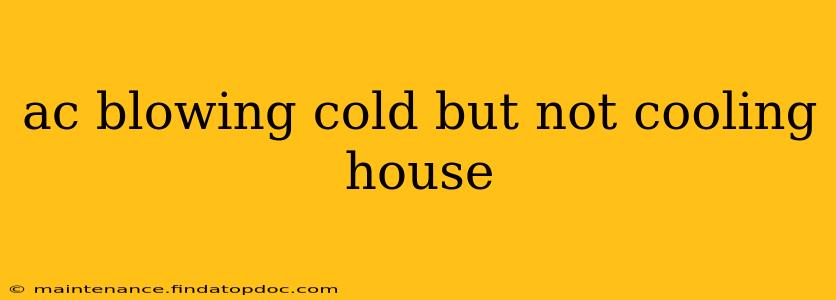Is your air conditioner blowing cold air, but your house isn't cooling down? This frustrating problem isn't uncommon, and often points to a specific issue within your HVAC system that needs attention. Let's diagnose the problem and explore potential solutions. Ignoring the issue could lead to higher energy bills and potential system damage.
Why is My AC Blowing Cold Air But Not Cooling My House?
This problem usually stems from a breakdown in the efficient transfer of cool air throughout your home. The most common culprits are:
- Insufficient Airflow: This is often the primary reason. Restricted airflow prevents the cool air from circulating effectively, leaving some rooms hot while others get the cold blast.
- Refrigerant Leaks: Low refrigerant levels hamper the system's ability to cool effectively, even if the air blowing from the vents feels cold.
- Dirty Air Filters: A clogged air filter severely restricts airflow, causing the system to work harder and less efficiently.
- Frozen Evaporator Coil: Ice buildup on the evaporator coil restricts airflow and can damage the system.
- Ductwork Problems: Leaky or poorly insulated ducts can lead to significant air loss before it reaches your living spaces.
- Problems with the Blower Motor: A malfunctioning blower motor might not be circulating air properly.
- Thermostat Issues: An incorrectly set or malfunctioning thermostat can prevent your AC from running efficiently or at all.
How to Fix an AC Blowing Cold Air But Not Cooling the House
Let's address some of the most common causes and their solutions:
1. Check and Clean Your Air Filter:
This is the easiest and most frequently overlooked solution. A dirty air filter restricts airflow, forcing your AC to work overtime and reducing its cooling capacity. Replace or clean your air filter at least once a month, or more frequently if you have pets or allergies. A clean filter is the first line of defense in maintaining efficient cooling.
2. Inspect Your Air Vents:
Ensure all vents are open and unobstructed. Furniture, rugs, or curtains blocking vents significantly reduce airflow. Make sure all vents are fully open and clear of obstructions.
3. Examine Your Ductwork (If Possible):
This is often the hardest to assess without professional help. Leaky or poorly insulated ductwork can significantly reduce cooling efficiency. Listen carefully near your ductwork for hissing or whistling sounds indicating leaks. Consider calling an HVAC technician for a thorough ductwork inspection. They can identify and repair leaks or recommend insulation improvements.
4. Check for Frozen Evaporator Coils:
A frozen evaporator coil is a clear sign of a more serious problem, often related to low refrigerant or a dirty air filter. Do not attempt to defrost the coil yourself. This requires professional attention to identify and fix the underlying issue, to prevent further damage.
5. Verify Your Thermostat Settings:
Ensure your thermostat is set to the correct cooling mode and is accurately reflecting the temperature in your home. Try setting the temperature lower to see if the unit responds appropriately. If it doesn't, the thermostat itself might need replacing or professional attention.
6. Consider Refrigerant Leaks:
This is a more complex issue that requires professional diagnosis and repair. Low refrigerant levels dramatically reduce cooling capacity. Never attempt to handle refrigerant yourself; it's a dangerous process requiring specialized tools and training.
7. Investigate Blower Motor Issues:
A weak or malfunctioning blower motor can reduce air circulation. This requires professional diagnosis and likely motor repair or replacement.
When to Call an HVAC Technician
If you've checked the easily accessible components and are still experiencing problems, it's time to call a qualified HVAC technician. These professionals have the expertise and tools to diagnose more complex issues, such as:
- Refrigerant leaks: Requiring specialized equipment and handling.
- Frozen evaporator coils: Indicating an underlying problem needing professional attention.
- Ductwork problems: Often requiring specialized tools and knowledge for repair or improvement.
- Blower motor malfunctions: Possibly needing replacement or repair.
By addressing these potential problems, you can often restore your AC's cooling capacity and ensure a comfortable home environment. Remember, regular maintenance and professional servicing are crucial for optimal performance and longevity of your HVAC system.
